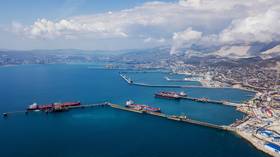Shipping costs for Russian oil rising – Bloomberg

The costs of transporting Russian oil are soaring as more tanker owners are avoiding the trade, while others are charging more for the risks involved ahead of EU sanctions that come into effect on December 5, Bloomberg reported on Thursday.
The bloc’s expanded restrictions on trade in Russian crude will ban EU companies from providing services such as insurance, brokerage or financial assistance to vessels carrying oil from the sanctions-hit country, unless the cargo is purchased below an agreed price. Similar restrictions, including a price cap for other petroleum products, are due in February.
Shipbrokers told the agency that Baltic Sea-to-India rates are being discussed at about $15 million, or $20 a barrel, for loadings after December 5, marking a sharp increase from the rates that, so far, have been fluctuating from $9 million to $11.5 million.
The reduced availability of tankers, as well as the need for Russian producers to reorient oil from traditional buyers in the EU to new ones in Asia and the Middle East, are also contributing to higher rates. Meanwhile, pricey freight is sending the value of Russian crude, such as its flagship Urals grade, plummeting at their load port, as sellers ensure that the final price of the cargo remains competitive against alternatives.
Late on Thursday, EU leaders tentatively agreed to set the price cap threshold for Russian seaborne crude at $60 per barrel. The governments also decided to implement an adjustment mechanism to keep the cap at 5% below the market price, Reuters reported, citing diplomat sources and documentation.
For more stories on economy & finance visit RT's business section












